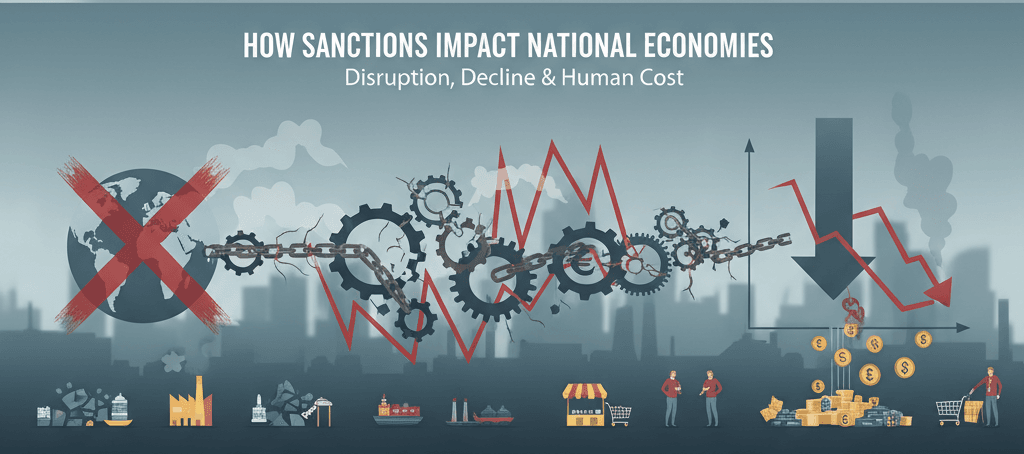How Sanctions Impact National Economies?
How Sanctions Impact National Economies?
Economic sanctions have become one of the most widely used tools in modern international relations. Governments and international organizations employ sanctions as a way to exert pressure on states, groups, or individuals without resorting to direct military confrontation. While they are often intended to punish governments or leaders, sanctions frequently have much broader consequences, impacting the overall health of national economies, the livelihoods of ordinary citizens, and the stability of global trade.
HSBC Cashback Credit Card 2025 – Benefits, Rewards & How to Apply?

Economic Sanctions: What Are They?
Economic sanctions are limitations placed on another country by a single nation or by a group of nations. They may manifest in a variety of ways, such as:
- Trade restrictions: Putting limits on the import and export of specific commodities.
- Financial sanctions include limiting capital flow, freezing assets, and preventing access to global banking institutions.
- Travel restrictions: Aimed at private citizens, corporate executives, or public servants.
- Embargoes: Total bans on doing business with a particular nation.
- Sectoral sanctions: Aiming at particular sectors, like defense, oil, or gas.
Sanctions are frequently promoted as a non-violent way to address issues of international law, human rights transgressions, or security concerns. Their effects on the economy, however, can be significant.
Sanctions’ Immediate Economic Repercussions
Trade Flow Disruption
Sanctions that limit imports or exports instantly disrupt supply chains and revenue sources. An oil-exporting country under sanctions, for instance, may lose billions of dollars in export earnings, while an importing country would experience shortages and increased expenses.
- Devaluation of Currency
Investor trust in a nation’s financial system is frequently damaged by sanctions. Currencies depreciate as reserves fall and foreign capital leaves. Inflation is fueled by this devaluation, which increases the price of imported commodities.
Rising Inflation
Restricted trade and a weaker currency often lead to sharp increases in consumer prices. Inflation not only lowers the purchasing power of citizens but also creates widespread social unrest and political instability.
Decline in Foreign Investment
Global investors typically avoid sanctioned economies due to political risk and uncertainty. This results in capital flight, reduced foreign direct investment (FDI), and slower economic growth.
Effects of Sanctions Over Time
Economic Structural Changes
Countries are forced to restructure their economies in order to comply with sanctions. While some countries try to move trade toward non-sanctioning partners, others try to replace imports with domestic production. This procedure is expensive and frequently ineffective.
Isolation of Technology
Limitations on high-tech products and services impede modernization and innovation. Because they have restricted access to cutting-edge technologies, countries like North Korea and Iran have experienced long-term stagnation in sectors like energy, telecommunications, and aviation.
Effect on Living Standards and Employment
When industries collapse under sanctions, unemployment rises sharply. Lower living standards, job losses, and wage cutbacks frequently fall most heavily on citizens.
Smuggling and Shadow Economies
Black marketplaces often expand as a result of sanctions. As sanctioned nations look for other ways to survive, smuggling of goods, illegal cash flows, and underground trade networks thrive.
The Impact of Sanctions on the World Economy
Sanctions have an effect on the entire world economy in addition to the targeted country.
- Increasing Energy Prices: Sanctions on exporters of gas and oil have the potential to raise energy costs globally, which would impact businesses and consumers everywhere.
- Supply Chain Disruptions: In economies with a high manufacturing sector, restrictions on the export of technology or raw materials cause supply networks to break down.
- Financial Market Volatility: Global market instability may result from currency fluctuations and waning investor confidence in sanctioned areas.
- commerce realignment: Sanctioned countries frequently turn to new trading partners, forming new economic blocs and changing the nature of international commerce.
Do Sanctions Work as Intended?
Although the goal of penalties is to alter government conduct, their efficacy is up for debate. Studies suggest that sanctions succeed in only about one-third of cases. Factors influencing success include:
- The level of international unity behind the sanctions.
- The resilience and adaptability of the targeted economy.
- The presence of alternative trading partners.
- Domestic political structures within the sanctioned country.
In some cases, sanctions strengthen authoritarian regimes by allowing leaders to blame external forces for economic hardship, consolidating power rather than weakening it.
Impact of Sanctions on Humanitarian Issues
Sanctions have serious humanitarian repercussions in addition to economic ones:
- Food insecurity: Essential products are in short supply due to restricted imports.
- Healthcare shortages: Pharmaceuticals and medical supplies frequently run out.
- Rising poverty: Loss of jobs and inflation push vulnerable populations into poverty.
- Inequality: Ordinary people suffer the most, while elites frequently escape the worst consequences.
International organizations frequently call for “smart sanctions” that target leaders and elites rather than entire populations, but the effectiveness of such measures is mixed.
In Conclusion
Sanctions are still a potent instrument of foreign diplomacy that influence both world politics and economies. Their effects are extensive and include trade disruption, currency devaluation, inflation, and industry transformation. While they sometimes succeed in altering political behavior, more often they inflict long-term damage on national economies and ordinary citizens.
The debate continues—are sanctions an effective instrument of justice, or do they create more suffering than solutions? As geopolitical tensions intensify in the 21st century, sanctions will remain central to global affairs, making it essential to understand their economic consequences in depth.
How to Value a Small Business for Sale: Complete Guide for Buyers and Sellers
How to Value a Small Business for Sale: Complete Guide for Buyers and Sellers
